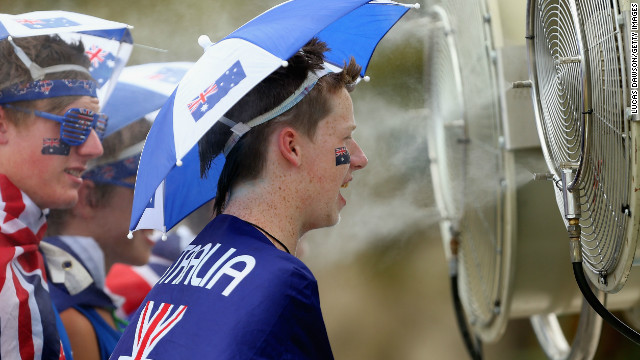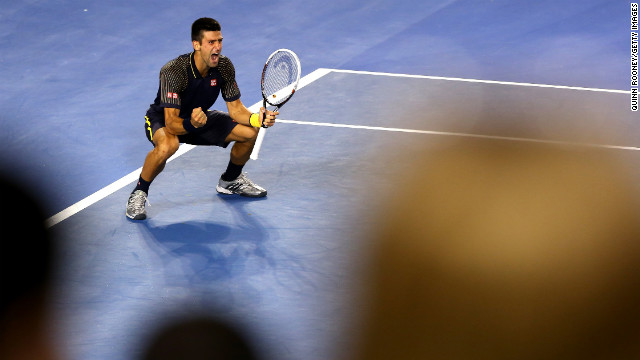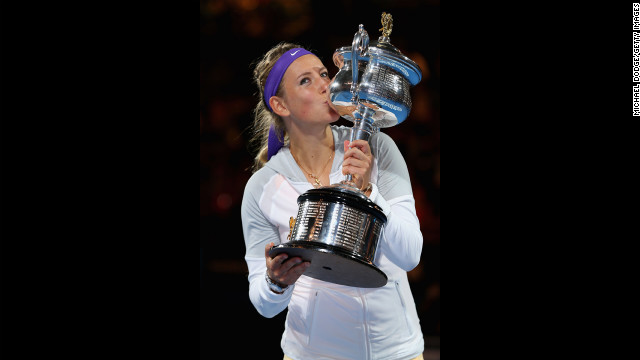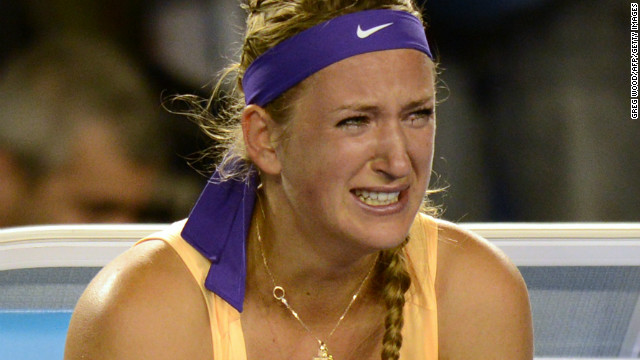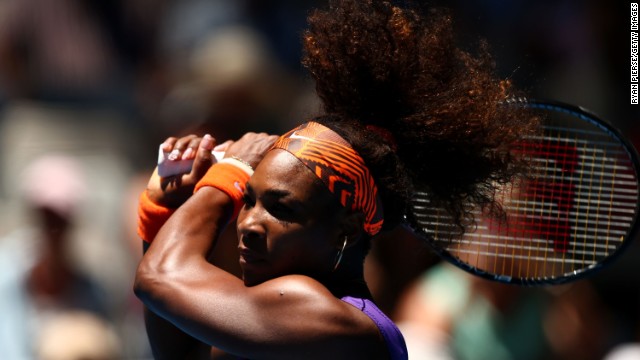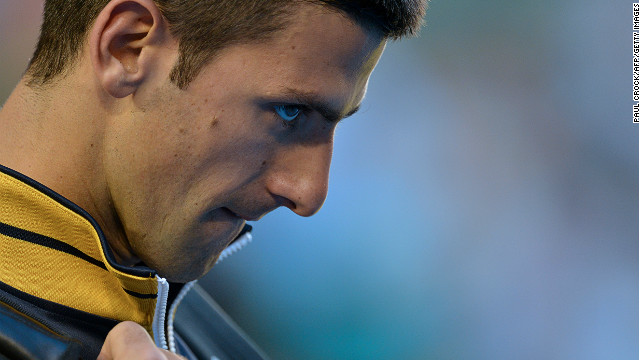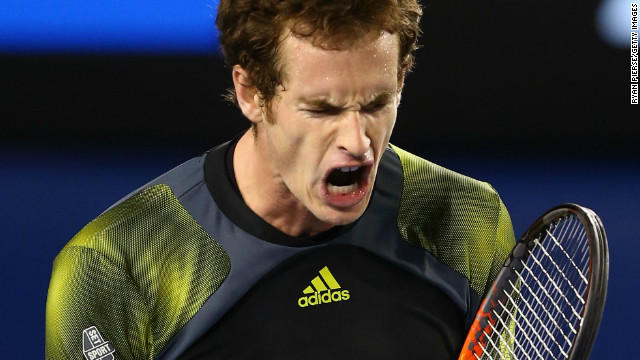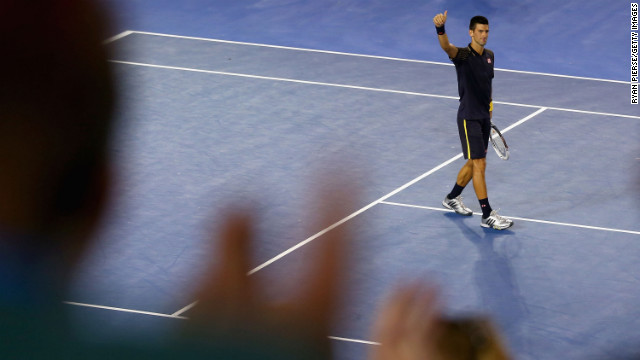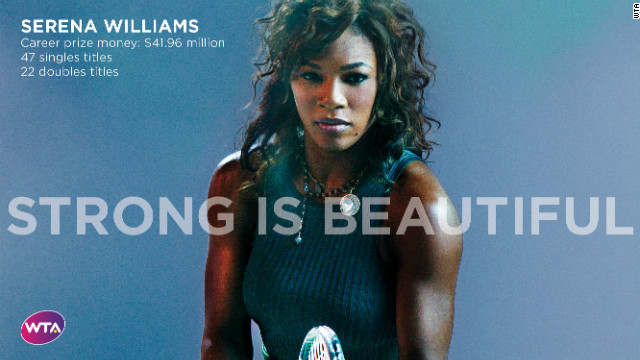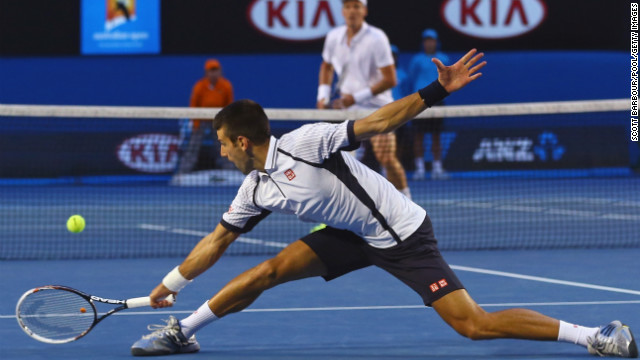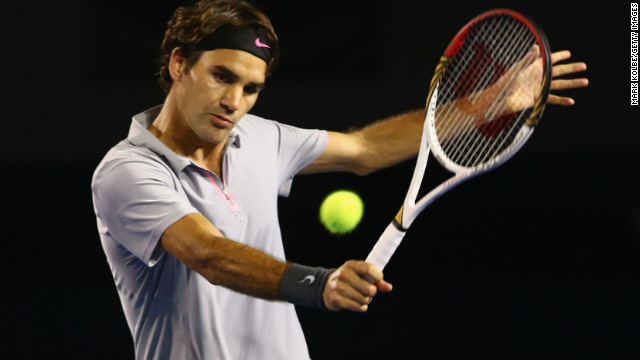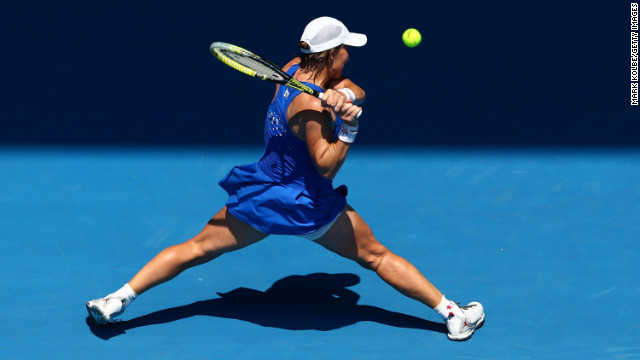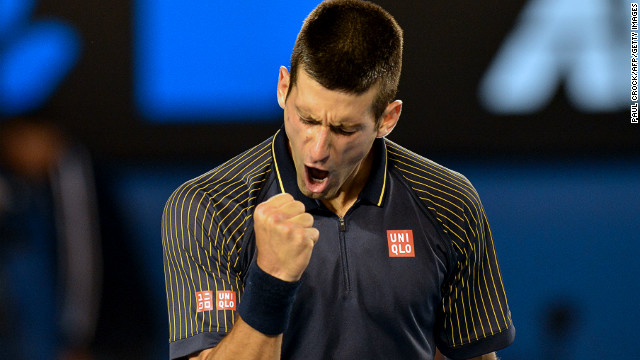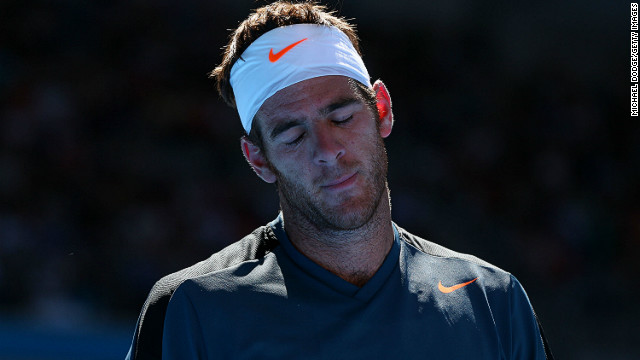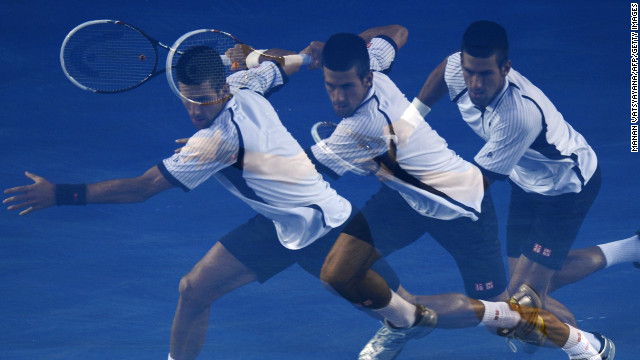
(CNN) -- The lactic acid builds up, your muscles are screaming, your body temperature sky-rockets -- trying to stay two shots ahead of your opponent proves impossible as your thoughts fragment into near delirium.
Five hours charging around a tennis court can be sheer hell even when you're winning, but if your body is out of balance then it's an even harder challenge.
Sunday's Australian Open finalists Novak Djokovic and Andy Murray once struggled with their fitness, but both have transformed their tennis careers since discovering a diet secret that is battling for acceptance in the world of mainstream sports science.
The benefits of going gluten free have been extolled for years by alternative health practitioners, but they have been brought to wider attention due to the exploits of high-profile stars such as Djokovic, whose wheat intolerance caused the world No. 1 severe breathing problems.
Read: The destiny of family guy Djokovic
"I knew from my experience that asthma was not the boy's problem but rather it was reflecting a symptom of something that was going on with his digestion," says Dr. Igor Cetojevic, who worked with Djokovic for a year up until his Wimbledon triumph in 2011.
"It was his sensitivity to gluten that was compromising his lungs," he adds, citing that in Chinese medicine there's believed to be a relationship between the large intestines and the lungs.
Our diet has changed dramatically in the past century, especially in Western countries. It's a trend that's spreading around the world due to the globalization of commerce, and the food industry in particular.
"I believe one of the problems is over consumption of gluten-containing grains, especially wheat, and the fact that it is genetically different from ancient wheat," says naturopathic physician Hamish Everard.
Cutting out wheat-based foods such as bread and pasta could be the best thing you ever do, says one of his clients, tennis coach Pete McCraw, who has helped develop top players such as Maria Sharapova and Jelena Jankovic.
Read: Djokovic beats Murray in Melbourne final
"The energy level that you have is something I've never experienced before. You don't ever have that crash, the high and then the low," McCraw told CNN.
"Those periods of the day when you crave carbs or sugar, feeling drowsy at work or in the car or wherever, you don't have that anymore, it's a completely different thing -- it's sustained, you don't have the foods cravings like I used to.
"It's a completely different energy source that your body's operating from. The ability to maintain a lean athletic figure is effortless."
The problem is not just wheat, but also processed dairy and sugars -- all of which we consume more regularly and in higher quantities than ever before.
"The gluten in food produces certain conditions; dairy, especially when produced conventionally, contributes to other factors to the detriment of our health," says Cetojevic, who is trained in both conventional and alternative medicine.
"Generally, milk is for babies. We don't need dairy products as we get older," he adds, and also warned against the intake of processed sugar.
"The change in food production has increased yields to the point of surplus but has not improved the quality of the food we eat. Often it contains traces of pesticides, hormones, preservatives, artificial colors, flavor enhancers and I won't even begin to talk about genetically modified organisms."
Read: Australian Open men's final as it happened
About 18 months ago, McCraw started noticing symptoms of extreme lethargy in young players he was working with.
"They were presenting chronic fatigue symptoms, although they weren't diagnosed in a traditional way, in terms of blood markers -- everything would come back reasonably normal," he said.
"Athletes would be complaining of excessive tiredness, even after light sessions. During a normal daily activity it was fine but then as soon as they began to exercise their blood sugar levels would drop significantly, and that causes concentration-behavior issues, (problems with) focus, emotional control.
"By the normal standards these were healthy teenagers and players in their early 20s, but they weren't healthy."
McCraw, who has held top coaching and development roles in his native Australia, New Zealand, Israel and at the Nick Bollettieri academy, works with players from age grade to elite level.
One of his clients had been seeing Everard to treat his celiac disease -- an autoimmune disorder caused by gluten intolerance that attacks the walls of the small intestine and makes it difficult for the body to absorb and process the nutrients that it requires.
Everard says that while only 1% of people are gluten intolerant, more than half of his clients are sensitive to it -- and 93% of them have seen benefits from eliminating gluten from their diet.
The improvements increase even further when processed sugars such as high-fructose corn syrup are taken out of the equation, says McCraw.
You might think bread and pasta are healthy foods, but essentially they break down into sugars like a chocolate bar does -- and this is not an energy source that human bodies evolved with.
"We're really designed physiologically to burn fat, it's what our body is designed to do. Shifting the major energy systems from sugar to fat is the transition you go through when you take a gluten-free option," McCraw said.
Read: Will a gluten-free diet help your health?
The first step in treating problems with gluten is to stop eating grain-based foods for at least four weeks, says Everard, but not -- especially for high-performance athletes -- to eliminate carbs altogether.
"We educate the patients about consuming gluten-free ancient whole grains. These include amaranth, buckwheat, corn, millet, uncontaminated organic oats, quinoa, sorghum, teff and rice. This gives the gastrointestinal tract (GIT) a chance to start repairing itself."
It needs help, and probiotics will aid restoration of the stomach's healthy bacteria and digestive enzymes, and also protect against further damage, Everard says.
"The research and my clinical results have found the GIT is weakened when we are exercising, especially in hot conditions and leaves the body susceptible to illness," he adds.
"The lining of the gut is very sensitive to the intense heat that endurance athletes train under. My patients have often complained of cramping in the gut, diarrhea or nausea and an increase in colds and flus after competitions and intense training.
"As the body heats up, small cracks form in the intestinal wall, allowing bacteria into the blood stream. We monitored our patients and found that when they did extensive exercise 82% showed symptoms of gut discomfort, reduced tolerance to the heat or a decrease in immune function."
In the case of Djokovic, who clinched a record third successive Australian Open title on Sunday, he had to give up childhood staples such as pizza, pasta and pancakes while introducing more vegetables and rice, fruit and sushi for easily digestible protein.
"At first, it was difficult for him but he was fed up of being stuck in third place and his determination to be the champion combined with his confidence in my knowledge was all the motivation that he needed to change his diet," says Cetojevic.
"I also suggested that he cut down on his consumption of meat, particularly before a match. Coming from Serbia, that was a radical suggestion -- even more so than cutting out gluten!
Read: Tearful Azarenka beats unlucky Li in final
"Because Novak was in very good condition from his constant training routine, the benefits were apparent almost immediately, which encouraged him to continue. The breathing problem vanished as did the frequent injuries and strains that had been hampering his progress."
McCraw says he has also seen "life-changing" results in his clients.
"Personalities changed, they were much calmer, had more clarity, better grades at school, their relationships with parents have improved, my relationship with them has matured," he said.
"Less sweating on the court, their endurance levels have increased, ability to maintain a leaner figure has improved, ability to build and hold muscle mass has improved. All of the things that an athletic trainer and coach would strive for, I've seen evidence of that on a daily basis."
However, a gluten-free diet might not suit everyone, says Susie Parker-Simmons, a sports scientist who works with the U.S. Olympic Committee as well as women's tennis players on the WTA Tour.
"There is no benefit in avoiding gluten if you do not have celiac disease or gluten intolerance," she told CNN.
"Therefore I would not recommend an athlete try this diet unless diagnosed by a medical professional."
She said that athletes might find it difficult to adhere to such a diet, especially tennis players who have to travel a lot and might have restricted food options.
"Gluten-free standards and labeling differs in each country. Before going overseas WTA players need to gain advice on the best foods to eat in their country of destination and order gluten-free meals on the airlines they are traveling with," she said.
"A large amount of carbohydrate-rich foods contain gluten in them e.g. bread, pasta, sports bars etc. An athlete with celiac disease needs to be very careful when selecting carbohydrate-based foods to ensure they receive their daily requirements."
Another problem is that many foods containing gluten are also important sources of fiber -- which the body needs to keep the intestines clear of toxins.
"Common gluten-free sources of fiber include: vegetables, fruit, brown rice, legumes, nuts and seeds," Parker-Simmons said.
She believes that while research has shown positive links between health improvement and a gluten-free diet, there is little to suggest it helps in terms of injury prevention and recovery.
McCraw, however, said that his players had shown improved ability to bounce back from intense workouts.
"There's always micro trauma in the muscles and joints, and the body has a natural anti-inflammatory response to that after exercise," he said.
"The gluten inhibits that process and therefore the onset of muscle soreness is worse. The general ability to recover and retain that homeostatic state is compromised. Your threshold of work levels is lower and your recovery rate is higher and longer."
Everard would like to see more studies into the effects of gluten, which he believes could be at the heart of many modern illnesses.
"This is a very complex area and not fully understood in mainstream medicine, however there is a huge amount of research and evidence in this field," he said.
"I see the benefits of a gluten-free diet in my patients every day through clinical experience, but there still needs to be more research done so that this can become more mainstream -- especially in the world of sport."
Many studies focus solely on the benefits or otherwise of eliminating gluten, rather than taking into account other dietary elements.
"The question is -- is it actually gluten that is the problem or is it refined grains or grains in general?" says British nutritional therapist Kate Delmar-Morgan.
"Individuals wishing to go down this route should seek proper nutrition advice and be tested if possible."
There is also the issue that many gluten-free products are processed and contain high levels of added sugars and artificial additives.
"People will look at these products and think they are 'healthy' just because they are advertised as gluten-free," Delmar-Morgan says.
"However if people stick to a wholefoods diet -- i.e. fresh fish, meats, vegetables, fruit, nuts and seeds, wholegrains which do not contain gluten, and they try to cook from scratch as much as possible and have limited pre-prepared foods -- they can then avoid this problem."
Via: Grand slam diet: Supercharge your body
